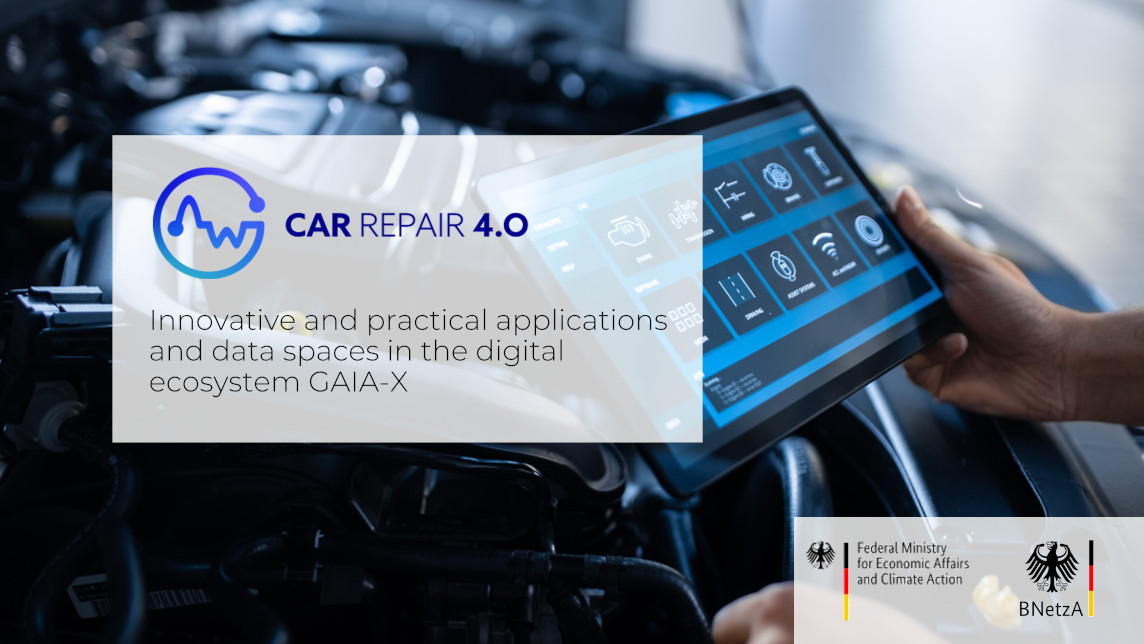
- Kick-off of the Autowerkstatt 4.0 (Car Repair 4.0) project: Consortium partners launch project to connect and digitalise SMEs
- Car Repair 4.0 connects over 5,000 independent car repair shops across Germany
- Project partners will develop AI and data platform with Gaia-X-connection for SMEs throughout Germany
- Data platform and AI-based fault diagnosis support car repair shops with increasing requirements due to electromobility
On 24 January 2022, the starting signal has been given for the Car Repair 4.0 (Autowerkstatt 4.0) project. In it, a consortium of partner companies and research institutes is developing a Germany-wide platform for the trustworthy exchange of industry-specific vehicle data. With the help of the platform, car repair shops can use intelligent fault diagnosis systems. Through the support of automotive oscilloscopes and AI-based methods, targeted troubleshooting is to be simplified and made more precise. The project is funded by the German Federal Ministry for Economic Affairs and Climate Action (BMWK) as part of the European data ecosystem Gaia-X.
Build a platform for trusted data exchange
The aim is to advance digitalisation in small and medium-sized enterprises (SMEs) in the automotive sector. Car repair shops, measurement system providers and AI startups will be linked to form an innovation and value creation network. “The Car Repair 4.0 project helps SMEs adapt to the demands of the digital age. This is giving rise to major potential for value creation and new business models for the Internet industry and the automotive sector,” says Andreas Weiss, Head of Digital Business Models at eco – Association of the Internet Industry at the launch event.
Increasing requirements for car repair shops due to electromobility
Especially with the increasing technical complexity of electric vehicles, Car Repair 4.0 helps car repair shops to better respond to the new requirements. Currently, car repair shops face a dual challenge: “They have to be able to handle the different combustion technologies and repair electric vehicles at the same time,” explained Dr. Jan Hendrik Schoenke, Head of R&D at consortium leader LMIS. As a result, vehicle parts tend to be replaced symptomatically instead of finding out the real cause of the fault through precise measurement procedures. Automotive oscilloscopes and AI-assisted methods are expected to help improve repair and maintenance here. More than 5,000 independent car repair shops in Germany want to participate in the project and provide, exchange and mutually use their vehicle data so that intelligent AI methods can be created from this data.
Consortium partners to develop platform in three years
Measurement system providers, AI start-ups, automotive companies and research institutes have come together in a consortium to develop such a platform. The consortium successfully competed in the BMWK funding competition “Innovative and practical applications and data spaces in the Gaia-X digital ecosystem“ and were awarded funding. LMIS AG is now managing the project as consortium leader. In addition, seven other consortium partners have taken on various tasks in the project: Auto-Intern GmbH, DEKRA DIGITAL, German Research Center for Artificial Intelligence GmbH, Osnabrück University of Applied Sciences, Georg Agricola University of Applied Sciences, Vergölst GmbH and eco – Association of the Internet Industry.
The Gaia-X and Car Repair 4.0 connection: A use case with European potential
The consortium partners Osnabrück University of Applied Sciences, LMIS AG and eco – Association of the Internet Industry are building the bridge and connection to the European data ecosystem Gaia-X, whose Federation Services will be put into practice together with various European partners. Within this framework, Car Repair 4.0 is one of the use cases being developed by industry in a Gaia-X-compliant manner. This means considering various Gaia-X principles in the project from the outset. For example, data collection, use, and analysis conform to certain data standards and values such as interoperability and interconnectivity. As a result, the data platform should also be usable for European car repair shops after the successful rollout in Germany, according to Andreas Weiss at the launch event in January.
The project will run for a total of three years and the consortium partners have set themselves various milestones during this time, such as the connection to Gaia-X, the training of car repair shop staff, and the roll-out of the AI & data exchange platform. The partners are looking forward to cooperating with the sister projects and with the German Gaia-X Hub.
